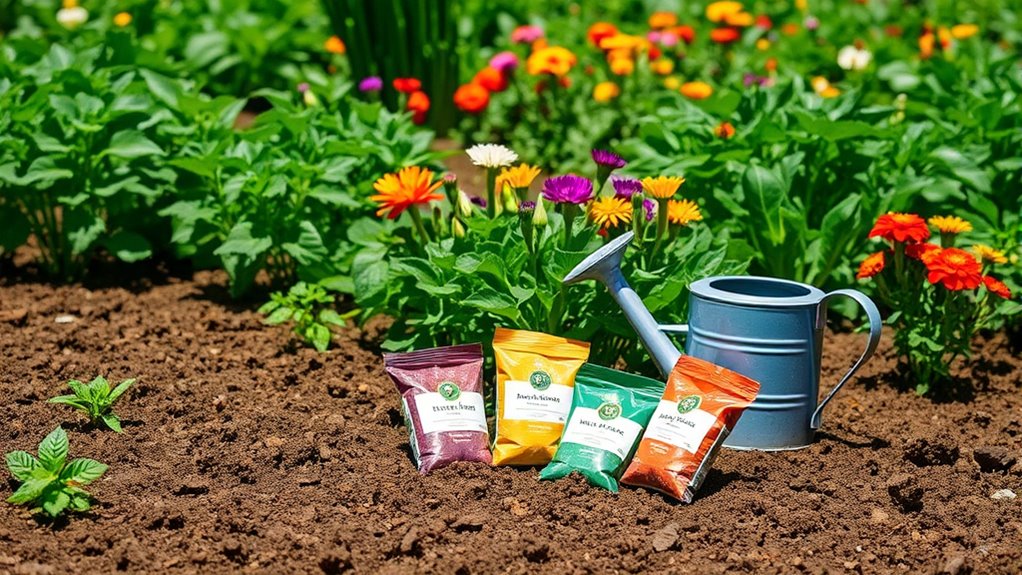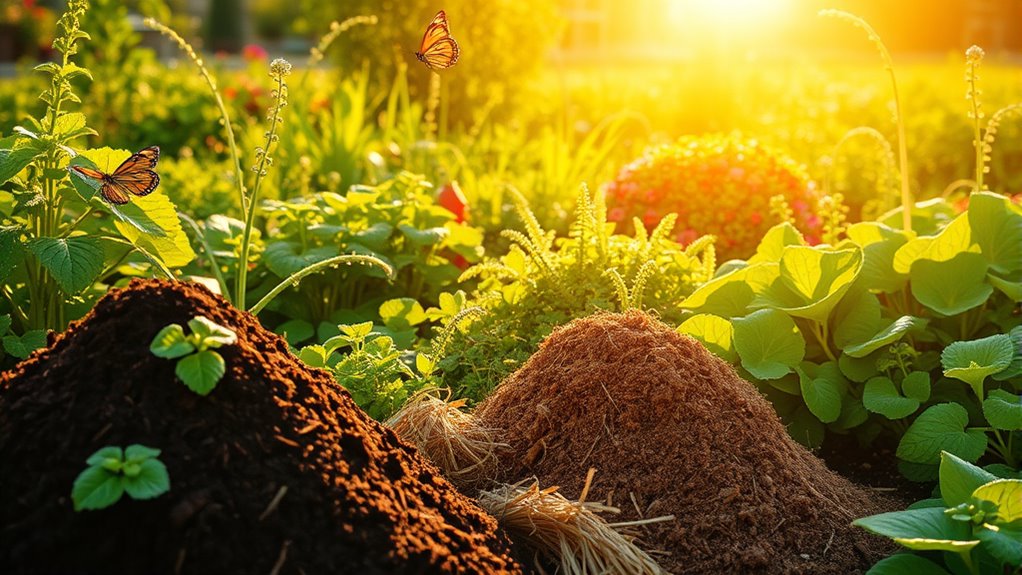If you want to boost your garden's health and growth, I've found that organic fertilizers like Espoma Organic Plant-Tone and Burpee Natural Purpose Granular work wonders. Down to Earth's 4-4-4 fertilizer and Jobe's Organics are also solid choices. Don't forget about True Organic and FoxFarm's Fertilizer Soil Trio for added benefits. Each one has unique ingredients and benefits. Stick around to discover more about these amazing options and how they can enhance your gardening experience!
Key Takeaways
- Espoma Organic Plant-Tone: A versatile 5-3-3 fertilizer ideal for flowers, vegetables, trees, and shrubs with noticeable improvements in plant health.
- Burpee Natural Purpose Granular: OMRI labeled and fast-acting, perfect for enhancing growth in both vegetables and flowers.
- Down to Earth Vegetable Garden Fertilizer: Balanced 4-4-4 NPK ratio supports a variety of vegetables with gradual nutrient delivery.
- Jobe's Organics Granular: Promotes soil moisture retention and faster growth, recommended for vegetable gardens and tomatoes.
- FoxFarm Big Bloom Liquid Fertilizer: Enriched with earthworm castings, this concentrate enhances root development and flower fragrance significantly.
Espoma Organic Plant-Tone All Purpose Plant Food (36 lb. Bag)
If you're looking for a versatile solution for your garden, Espoma Organic Plant-Tone All Purpose Plant Food is an excellent choice. This all-purpose organic fertilizer, with a 5-3-3 analysis, works wonders for flowers, vegetables, trees, and shrubs. I appreciate that it's made from natural ingredients and approved for organic gardening, so I can feel good about using it. I love applying it in spring and fall, and I've noticed my plants thriving. Just sprinkle it around the drip line, water it in, and you're set. Store it properly, and you'll find it easy to use without the odor.
Best For: Gardeners looking for an all-purpose organic fertilizer suitable for a variety of plants including flowers, vegetables, trees, and shrubs.
Pros:
- Environmentally safe and made from natural ingredients, approved for organic gardening.
- Easy to apply; requires no mixing and can be sprinkled around the plant's drip line.
- Users report noticeable improvements in plant health and growth.
Cons:
- Not suitable for acid-loving plants like hydrangeas and blueberries.
- Some users find the product slightly smelly if not stored properly.
- May require transferring to a different container for easier handling.
Burpee Natural Purpose Granular Organic Food for Strong Plants
For anyone looking to boost their garden's health, Burpee Natural Purpose Granular Organic Food for Strong Plants stands out as an excellent choice. This OMRI labeled organic food is perfect for vegetable gardens, flower beds, and even seed starting. With essential nutrients and beneficial microbes, it promotes growth and blooming for up to three months. I've noticed impressive results in my plants within days of application. The granules are easy to use, making them ideal for both indoor and outdoor gardening. Just a heads-up, if you're sensitive to strong smells, be cautious of the dust during use!
Best For: Gardeners looking for an organic solution to enhance plant growth and health in vegetable and flower gardens.
Pros:
- Promotes strong growth and blooming in various plants for up to three months.
- Easy-to-apply granules provide fast-acting results for both indoor and outdoor gardening.
- OMRI labeled organic, ensuring safe use for all types of plants.
Cons:
- Some users may find the strong smell off-putting during application.
- Dust may be present, which could be a concern for those sensitive to it.
- Limited to use in certain gardening situations, such as seed starting and container gardening.
Down to Earth Organic Vegetable Garden Fertilizer 4-4-4, 5lb
Down to Earth Organic Vegetable Garden Fertilizer 4-4-4, 5lb stands out for gardeners looking for a balanced and eco-friendly solution. With its 4-4-4 NPK ratio, it supports healthy growth for a variety of vegetables. I love how it's non-toxic and safe for my pets and beneficial insects, promoting a healthier ecosystem in my garden. The slow-release formula gradually delivers nutrients, reducing waste and ensuring my plants thrive. Plus, it's easy to apply directly to the soil or mix into garden beds. With great user feedback, I'm excited to see my peppers and veggies flourish!
Best For: Gardeners seeking an eco-friendly, balanced fertilizer that is safe for pets and beneficial insects while promoting healthy vegetable growth.
Pros:
- Balanced 4-4-4 NPK ratio supports a wide variety of vegetable plants.
- Non-toxic and safe for pets, beneficial insects, and the ecosystem.
- Slow-release formula ensures gradual nutrient delivery, reducing waste.
Cons:
- Limited to a 5 lb box, which may not be enough for larger gardens.
- May take longer to see results compared to synthetic fertilizers.
- Some users may find application requires more effort compared to liquid fertilizers.
Jobe's Organics Granular Garden Fertilizer (4 lbs Bag)
Jobe's Organics Granular Garden Fertilizer is the ideal choice for gardeners looking to enhance their vegetable gardens and tomato plants organically. With an NPK ratio of 2-5-3, it delivers essential nutrients for vibrant foliage and high yields. I love that it's OMRI listed, meaning it's free of synthetic chemicals. The inclusion of Biozome encourages faster growth and earlier fruit production, while also improving soil moisture retention. I've seen remarkable growth in my plants, and they've become less appealing to pests. Just remember to apply every 4-6 weeks, and you'll enjoy a bountiful harvest with this reliable fertilizer!
Best For: Gardeners seeking an organic solution to enhance the growth and yield of vegetable gardens and tomato plants.
Pros:
- Organic and OMRI listed: Free of synthetic chemicals, making it safe for organic gardening.
- Biozome inclusion: Promotes faster growth and earlier fruit production through beneficial microbes.
- Improves soil moisture retention: Helps plants withstand heatwaves, leading to healthier plants.
Cons:
- Potent aroma: Some users may find the smell unpleasant after application.
- Lack of specific information: Concerns about the unidentified microbes in Biozome may be a drawback for some gardeners.
- Not suitable for indoor use: Limited to outdoor gardening, making it unusable for houseplants.
True Organic All Purpose Plant Food – Organic Fertilizer (4lb Bag)
True Organic All Purpose Plant Food is an excellent choice for gardeners looking to enhance their soil and nourish a variety of plants, from fruits and vegetables to vibrant flowers and herbs. With a balanced blend of nutrients, including nitrogen, phosphate, and potash, it promotes healthy growth. I love that it's easy to apply, whether I'm using it in the ground or in pots. Many users, including myself, have noticed remarkable improvements in plant health and growth. Just keep in mind the smell when mixing, but it fades quickly. Overall, it's a fantastic addition to any garden!
Best For: Gardeners looking to enhance the growth and health of fruits, vegetables, flowers, and herbs using organic fertilizer.
Pros:
- Promotes healthy growth with a balanced blend of essential nutrients.
- Easy to apply for both in-ground and container plants.
- Users report noticeable improvements in plant health and rapid response after application.
Cons:
- Some users find the smell unpleasant when mixing the product.
- Limited effectiveness noted in repotted plants and hydroponic gardens.
- Requires monthly application during the growing season for best results.
Back to the Roots Organic All-Purpose Plant Food (5 lb. Value Size)
If you're looking for a reliable organic fertilizer that supports a variety of plants—from vibrant flowers to tasty vegetables—Back to the Roots Organic All-Purpose Plant Food (5 lb. Value Size) is a fantastic choice. It's made from 100% plant and mineral-based ingredients, including kelp and alfalfa meal, ensuring safety for all your green friends. I love how easy it is to apply; just mix a tablespoon with a gallon of water. Plus, it's vegan and eco-friendly, which makes me feel good about using it. With a solid 4.4-star rating, it's clear that many gardeners, like me, are satisfied!
Best For: Gardeners looking for a safe, effective, and vegan-friendly fertilizer for a variety of plants including herbs, flowers, fruits, and vegetables.
Pros:
- Made from 100% plant and mineral-based ingredients, ensuring safety for all plants.
- Easy to use with a simple mixing ratio of 1 tablespoon per gallon of water.
- High customer satisfaction with a rating of 4.4 out of 5 stars from 427 reviews.
Cons:
- Some users may find the 5 lb. size insufficient for larger gardens.
- Limited availability in certain regions may affect accessibility.
- The NPK ratio of 2-3-3 may not meet the specific nutrient needs for all plant types.
FoxFarm Big Bloom Liquid Fertilizer Concentrate for Plants
For anyone looking to boost the health and energy of their garden, FoxFarm Big Bloom Liquid Fertilizer Concentrate stands out as an excellent choice. This liquid fertilizer is packed with earthworm castings and bat guano, offering essential nutrients without harmful chemicals. I love how it enhances root development and intensifies flower fragrance, leading to richer flavors in my fruits and herbs. It's simple to mix—just 2-3 tablespoons per gallon—and can even be used as a foliar spray. With regular application every 7-10 days, I've noticed vibrant blooms and lush growth, making my garden thrive beautifully.
Best For: Gardeners looking to enhance the growth and flavor of their flowering and fruiting plants, both indoors and outdoors.
Pros:
- Formulated with natural ingredients like earthworm castings and bat guano, providing essential nutrients without harmful chemicals.
- Promotes robust growth and vibrant blooms, significantly improving the health of plants and yields.
- Easy to use, with clear mixing instructions and the option for foliar applications for quick nutrient boosts.
Cons:
- Low-NPK ratio may require more frequent applications compared to traditional fertilizers.
- Over-dilution can lead to less effective results, requiring careful measurement.
- Results can vary based on soil quality and specific plant needs, necessitating additional amendments for optimal performance.
Espoma Organic Berry-Tone Fertilizer and Plant Food for Berries (4 lb, Pack of 2)
Espoma Organic Berry-Tone Fertilizer is the perfect choice for gardeners looking to cultivate lush, fruitful berry plants. This natural and organic fertilizer, with a 4-3-4 analysis and 5% sulfur, provides essential nutrients for blueberries, strawberries, raspberries, and blackberries. I love that it comes in ready-to-use granules, making application a breeze—just feed your plants twice yearly in early and late spring. Plus, it's certified organic, ensuring no harmful ingredients are present. With an impressive average rating of 4.7 stars from nearly 900 users, I can confidently say it's a fantastic option for boosting your berry garden's health and productivity.
Best For: Gardeners seeking to enhance the growth and productivity of berry plants like blueberries, strawberries, raspberries, and blackberries.
Pros:
- Easy to use granules that require no mixing.
- Certified organic, ensuring safety for the environment and plants.
- High customer satisfaction with an average rating of 4.7 out of 5 stars.
Cons:
- Limited to berry plants, may not be suitable for all types of gardening.
- Requires feeding twice a year, which may not be convenient for all gardeners.
- Available in a pack of 2, which might be more than some casual gardeners need.
Espoma Organic Tomato-Tone Fertilizer (4 lb. Bag, Pack of 2)
Looking to boost your tomato harvest? I highly recommend Espoma Organic Tomato-Tone Fertilizer. This 4 lb. bag, sold in packs of 2, features a 3-4-6 formula with 8% calcium, perfect for preventing blossom end rot. It's suitable for all tomato varieties and even other vegetables like zucchini and eggplants. I love that it's made from natural ingredients and is environmentally safe. Just apply it every two weeks around the plant's drip line, and you'll see impressive results. Many users, including myself, have noticed increased fruit production and size. It's a fantastic choice for organic gardening!
Best For: Home gardeners looking to enhance their tomato yield and overall vegetable production using organic methods.
Pros:
- Organic and environmentally safe, free from toxic ingredients.
- Promotes healthy growth and prevents common issues like blossom end rot.
- Easy to use with no mixing required, ensuring convenience for gardeners.
Cons:
- Requires application every two weeks, which may be seen as frequent for some users.
- Limited to specific types of plants, primarily tomatoes and a few other vegetables.
- Available only in a 4 lb. bag, which might not be sufficient for larger gardens.
FoxFarm Fertilizer Soil Trio Liquid Nutrient (Pack of 3-1 Pint)
FoxFarm Fertilizer Soil Trio Liquid Nutrient is an excellent choice for gardeners seeking a complete nutrient system that supports every growth stage. This trio includes Grow Big for lush vegetative growth, Big Bloom for all plants, and Tiger Bloom for vigorous flowering and fruiting. I love how easy it is to mix and apply, making it perfect for both indoor and outdoor plants. Customers rave about noticeable growth and abundant harvests, though the strong scent and careful dosing are worth noting. Overall, this fertilizer has transformed my garden, ensuring my plants thrive beautifully throughout their lifecycle.
Best For: Gardeners looking for a comprehensive nutrient solution that supports all plant growth stages.
Pros:
- Complete nutrient system covering all growth stages for various plant types.
- Noticeable plant growth, resulting in faster, greener, and stronger plants.
- Simple application process with clear dilution instructions.
Cons:
- Strong smell, which is typical of organic nutrients.
- Requires careful dosing to avoid potential plant burn.
- Possible fertilizer build-up in containers; flushing recommended before harvest.
Espoma Organic Plant-Tone All Purpose Plant Food (50 lb. Bag)
If you're a passionate gardener seeking a reliable organic solution for all your plants, the Espoma Organic Plant-Tone All Purpose Plant Food is an excellent choice. This 50 lb. bag features a balanced 5-3-3 nutrient composition enhanced with the Bio-tone formula, making it perfect for flowers, vegetables, trees, and shrubs. I appreciate its versatility; I apply it in spring and fall for my trees and shrubs, and monthly for my flowers and veggies. It's organic certified, safe for the environment, and delivers noticeable results. With a 4.7-star rating, it's definitely a staple in my gardening routine!
Best For: Gardeners looking for a reliable and effective organic fertilizer for a variety of plants, including flowers, vegetables, trees, and shrubs.
Pros:
- Effective slow-release fertilizer enhances plant growth and health.
- Registered organic input material, ensuring environmental safety and compliance with organic standards.
- Versatile application frequency leads to satisfied plants throughout the growing season.
Cons:
- Concerns about packaging durability during shipping may lead to product loss or damage.
- Notable difference in dust content compared to smaller bags could affect ease of use.
- Larger bag size may be cumbersome for small-scale gardeners.
Factors to Consider When Choosing Organic Fertilizers

When choosing organic fertilizers, I always consider several key factors to guarantee the best results for my garden. It's important to look at nutrient composition, plant suitability, and the application methods that fit my gardening style. Plus, I make sure the products meet environmental safety standards and have the necessary organic certifications.
Nutrient Composition Analysis
Understanding the nutrient composition of organic fertilizers is essential for any gardener looking to maximize plant health and productivity. I always check the NPK ratio, which indicates the primary nutrients—Nitrogen, Phosphorus, and Potassium—needed for growth. But it's not just about the major nutrients; many organic options also provide secondary nutrients like calcium and sulfur, which enhance overall health. I find that some fertilizers contain beneficial microbes, boosting nutrient availability and creating a thriving soil ecosystem. Another advantage is their gradual nutrient release, minimizing leaching and ensuring plants get a steady supply. Finally, I make sure to choose products with OMRI listings, ensuring they meet strict organic standards for my gardening practices.
Plant Suitability Considerations
Choosing the right organic fertilizer can feel overwhelming, especially since different plants have unique nutrient needs. I always consider the NPK ratio before making a choice. For instance, flowering plants thrive on higher phosphorus levels, while veggies often do better with balanced ratios. It's also important to match the fertilizer to the specific plant type; some are crafted for flowers, others for acid-loving plants. I look for fertilizers that promote root development or enhance soil health, as these features can greatly impact growth. Additionally, I pay attention to the beneficial microbes in many organic options, which boost soil fertility. Finally, I keep in mind that some plants require more frequent feeding than others, guiding my selection further.
Application Method and Frequency
Applying organic fertilizers effectively can make a significant difference in your garden's health and productivity. I've learned that application methods vary greatly; some fertilizers are ready to use, while others need mixing or incorporation into the soil. The frequency of application is vital. For ideal growth, I find that monthly applications during the growing season work wonders for flowers and vegetables. Timing matters too—spring and fall applications for trees and shrubs support their growth. Many organic fertilizers offer slow-release formulas, which gradually provide nutrients, minimizing leaching and ensuring a steady supply. I always apply fertilizers around the plant's drip line and water thoroughly to enhance absorption and prevent root burn. This approach has transformed my garden!
Environmental Safety Standards
When selecting organic fertilizers, it's essential to take into account environmental safety standards that guarantee the products don't harm ecosystems or introduce toxic substances into your garden. I always look for fertilizers that meet these standards, ensuring they don't contain harmful sludges or toxic ingredients. Products labeled as OMRI listed are a great choice, as they meet stringent requirements for organic approval. I appreciate that organic fertilizers often support beneficial insects and pollinators, fostering a healthier garden environment. Plus, their naturally derived ingredients reduce the risk of nutrient leaching and pollution. Many are also non-toxic to pets and wildlife, allowing me to create a safer garden space without compromising plant health. Choosing wisely makes a difference!
Organic Certification Requirements
Understanding organic certification requirements is vital for anyone looking to select the right fertilizers for their garden. Organic fertilizers must comply with the USDA's National Organic Program standards, which ban synthetic chemicals and mandate the use of natural materials. I always check for certifications from organizations like OMRI, which evaluate and list products that meet these organic standards. To qualify for USDA organic certification, at least 95% of the ingredients must come from natural sources. It's important to guarantee that the fertilizers are free from harmful additives like heavy metals and GMOs. By choosing certified organic options, I can enhance soil health and promote biodiversity, aligning my gardening practices with sustainable agriculture.
Packaging and Storage Options
Choosing the right packaging and storage options for organic fertilizers can greatly impact their effectiveness and convenience. I've found that the size of the packaging matters; whether you opt for a small 4 lb bag or a larger 50 lb bag, consider your storage space and how often you'll use it. I prefer resealable bags or containers to keep the fertilizer fresh and minimize odors. It's essential to guarantee the packaging is durable enough to avoid leaks or damage during shipping. I also check for clear labeling that includes usage instructions and storage recommendations. Finally, be mindful of potential dust or strong odors, as these factors can influence my choice of storage solutions.
Frequently Asked Questions
How Often Should I Apply Organic Fertilizers to My Garden?
When I think about applying organic fertilizers, I usually aim for every four to six weeks during the growing season. It keeps my plants nourished without overwhelming them. I watch my plants closely, adjusting frequency based on their needs and the specific fertilizer I'm using. If I notice any signs of nutrient deficiency, I might apply a little more often. Balancing is key, and I always find that consistency pays off in the long run.
Can Organic Fertilizers Harm Beneficial Soil Microbes?
I often wonder if organic fertilizers can harm beneficial soil microbes. From my experience, they generally support microbial health rather than harm it. These fertilizers provide nutrients that microbes thrive on. However, if I overapply or use products high in salts, it might create an imbalance. I've learned it's essential to follow guidelines and monitor my soil's health to guarantee I'm fostering a thriving ecosystem in my garden. Balance is key!
Are There Organic Fertilizers Safe for Indoor Plants?
Absolutely, I've found several organic fertilizers that are safe for indoor plants. Products like fish emulsion and seaweed extract work wonders without harming your indoor environment. I often use compost tea, too; it enriches the soil while promoting healthy growth. Just make sure to follow the recommended application rates to avoid any issues. It's great knowing I can keep my indoor plants thriving without worrying about any harmful chemicals!
How Do I Store Leftover Organic Fertilizers?
When I store leftover organic fertilizers, I always make certain to keep them in a cool, dry place. I use airtight containers to prevent moisture from getting in, which can spoil the fertilizers. Labeling the containers with the date and type helps me keep track. If the fertilizers are liquid, I shake them well before using them again. By following these steps, I make sure my fertilizers stay effective for future use!
Can I Make My Own Organic Fertilizer at Home?
Did you know that over 30% of the food we produce ends up wasted? I've found making my own organic fertilizer at home not only reduces waste but also enriches my garden. You can easily create it using kitchen scraps like vegetable peels, coffee grounds, and eggshells. Just compost these materials, and in a few weeks, you'll have nutrient-rich fertilizer that's perfect for boosting your plants' health and growth. It's rewarding and eco-friendly!
Conclusion
In summary, choosing the right organic fertilizer can be as rewarding as finding a hidden treasure in your garden. Each product we've explored offers unique benefits to nourish your plants and enhance their growth. By considering your specific needs and preferences, you can select the perfect fertilizer to guarantee your garden thrives. Remember, a healthy garden isn't just about the plants; it's about the joy they bring to your life. Happy gardening!


















